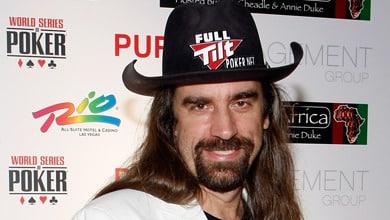Chris Ferguson, known in the poker world as “Jesus” for his distinctive long hair and beard, is a figure whose contributions to poker are as significant as the controversies surrounding him. Born on April 11, 1963, in Los Angeles, California, Ferguson’s journey in poker is marked by notable achievements, including six World Series of Poker (WSOP) bracelets, showcasing his skill and strategic mastery of the game.
Early Life and Education
Ferguson’s interest in games and strategy began early, influenced by his parents’ doctoral backgrounds in mathematics. He pursued computer science at UCLA, where he earned a Ph.D. His academic background in game theory and computer algorithms would later form the foundation of his approach to poker, emphasizing analytical strategies and mathematical precision.
Poker Career and Achievements
Ferguson’s poker career took off in the late 1990s, and he quickly became known for his cool demeanor and analytical playing style. His most notable achievement came in 2000 when he won the WSOP Main Event, securing his place among poker’s elite. Over his career, Ferguson has accumulated six WSOP bracelets, tying him with other legends of the game for his number of wins.
Beyond the table, Ferguson contributed to the theoretical aspects of poker, sharing insights on game theory and strategy that have influenced players worldwide. His ability to apply complex mathematical concepts to real-time gameplay earned him respect and admiration from peers and fans alike.
Controversies and Full Tilt Poker
Despite his accomplishments, Ferguson’s legacy is intertwined with the Full Tilt Poker controversy. As a co-founder and board member of the online poker platform, Ferguson became embroiled in legal issues when Full Tilt faced accusations from the U.S. Department of Justice of defrauding players in 2011. The platform’s failure to refund players’ deposits after being shut down led to widespread criticism and a significant blow to Ferguson’s reputation within the poker community.
In the following years, Ferguson largely withdrew from the public eye, only to return to the poker scene with mixed reception. His attempts to reconcile with the poker community have been met with varied responses, reflecting the ongoing debate about his legacy.
Legacy and Reflection
Chris Ferguson’s story is a reminder of the complexities that often accompany high-stakes competitive environments. His contributions to poker strategy and his remarkable achievements at the WSOP are part of a legacy that has significantly influenced the game. Yet, the controversies linked to Full Tilt Poker serve as a cautionary tale about the importance of transparency and ethical management in the gaming industry.
As Ferguson continues to participate in poker events, the poker community remains divided on his legacy. Some appreciate his undeniable skills and contributions to the game’s strategic development, while others cannot overlook the impact of the Full Tilt Poker controversy.
Conclusion
Chris Ferguson’s journey in the world of poker is a blend of remarkable talent and contentious decisions. His story encapsulates the highs and lows of a life dedicated to a game that combines skill, strategy, and, inevitably, risk—both at and away from the poker table.

Garry Sputnim is a seasoned journalist and storyteller with over a decade of experience in the trenches of global news. With a keen eye for uncovering stories that resonate, Alex has reported from over 30 countries, bringing light to untold narratives and the human faces behind the headlines. Specializing in investigative journalism, Garry has a knack for technology and social justice issues, weaving compelling narratives that bridge tech and humanity. Outside the newsroom, Garry is an avid rock climber and podcast host, exploring stories of resilience and innovation.


